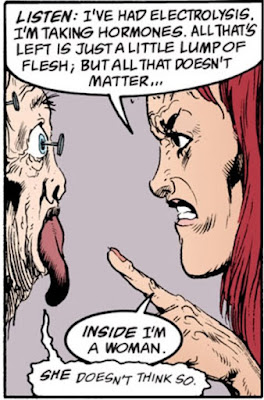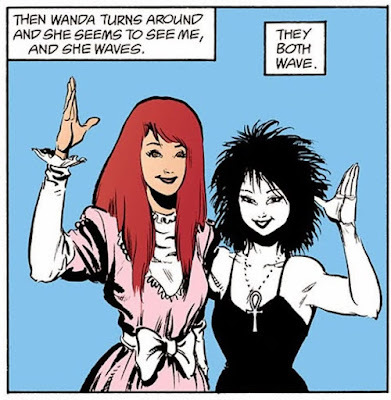People with far better insight than mine have named problems with the trans representation in Neil Gaiman’s comics epic The Sandman, most notably the character of Wanda in “A Game Of You”. I have immense love for the young trans people who are pained by its weaknesses; it is very good that we have a lot of work from trans creators now which does much better than “A Game Of You” did then.
And I think some readers simply misread what the story presents, often from seeing things out of context.
Spoilers ahead.
Consider this panel sequence offered as evidence that “A Game Of You” is “TERFy”. The redhead is Wanda, a trans woman. Since The Sandman is a lot of things, including both fantasy and horror, she is talking to a human face nailed to a wall named George, who was enchanted by a mostly-villainous witch who at that point has departed on a magical journey enabled by goddesses and the Moon.
Kevin Riggle says of this:
I feel like a lot of the tension come from folks wanting Gaiman’s universe to be just — and I’ll be honest, the goddesses’ rejection of Wanda struck me to the core. But his universe, much like our own, isn’t inherently just, and the goddesses aren’t avatars of justice within it
Which is something folks struggle with mightily in modern works from trans and queer creators too
And it’s always dispiriting to watch our communities reenact the traumas we’ve experienced on younger creators, over and over and over again
Gaiman, commenting on that sequence, says much the same thing:
Yes, there were transphobic and TERFy characters in “A Game of You”. And there were other characters too, with very different opinions on the matter. With respect, I'm not sure you understand how literature works.
Is this just rationalizing in retrospect? Sunny Moraine reflects on the book in context.
In talking about something like “A Game of You” it is absolutely critical that we be able to recognize how in some ways it fails by today’s standards while also recognizing that for many older trans folks it was powerfully and overwhelmingly affirming. Stories like “A Game of You” help produce the better world in which “A Game of You” hasn’t aged altogether well.
I’m glad parts of it don’t look so great now. It makes me appreciate it more.
Representation doesn’t have to be perfect to be meaningful.
REPRESENTATION DOESN’T HAVE TO BE PERFECT TO BE MEANINGFUL.
“A Game of You”’s open and explicit stance is that trans women are women. Doesn’t mean the imperfections aren’t there but I’m sorry, in 1993 that’s fucking huge.
Among the problems “A Game Of You” has to the contemporary eye is how Wanda does not survive the story, which plays into a bad Bury Your Gays trope. Her death does do a lot of thematic work, though. Wanda’s death is not the end of her story; Barbie attends Wanda’s funeral, where she is rightly disgusted at how Wanda’s family dishonor her her by denying who she was — ending on Barbie countering the way they deadnamed her, which many defenders of the story have shared on social media.
This vindication does not make it okay to repeat the trope, but I know how moving I found that page when, little acquainted with trans people, I read it thirty years ago. Other things stand up better. Wanda is on stage for a few chapters before the story bothers to mention that she is trans. And most of all to me, just a couple of pages after the page above another sequence, in which we get this:
Moraine says of that:
And again, whatever the TERFy fucking goddesses say, Neil is very very clear in these panels whose side he’s on.
To emphasize the point: The Sandman is a fantasy epic which spans nearly all of time and space and that goth girl is a cosmic entity offered to us elsewhere in the book as literally the most wise being in the Universe. The Sandman says that if the Moon thinks you are a boy when you know you are a girl, the damm Moon is wrong. Fīat jūstitia ruat cælum.
The nightling argues that this justifies Wanda’s death as a storytelling move in a heartfelt commentary.
And there are tropes like “women in refrigerators” (which means a love interest- usually female- death is used to motivate a hero) or “bury your gays” (where it seems only the gay character is killed off). But there is one LGBT+ character death where I’m very glad the character died. And it’s a character I actually like.
[⋯]
Wanda’s death was important because it was the first time in a comic you saw a Trans woman’s soul as a woman— revealing that she is a woman where it matters most. Her death was the easiest way to show this.
It is a victory that many young queer people find The Sandman unreadable because they cannot imagine the world it was published into, a world in which it was a thunderclap of rich and vigorous queer representation. We honor a work like The Sandman by criticizing it, because that says it meets the standard which creators need to meet when representing people significantly different from themselves: to do something good enough to be worth criticism.
We honor those works further by moving past them. As we have done, and I hope we do further. But I hope not completely just yet. Because it has been obvious from when the Netflix streaming adaptation of The Sandman was first announced that one of Gaiman’s key motivations has been getting another bite at the apple of “A Game Of You” with the involvement of trans creators.
Via Felix Marques, I have a bushel of quotes from Gaiman about that.
Things have changed. And because now there are lots of fantastic trans people making comics and telling their own stories. And I no longer would go, “hang on, I have trans friends. I am not seeing people like my trans friends in the comics that I am reading. So I am going to put people like my friends in my comics, because that’s reflecting my world.” By the way, if you are a 15-year-old boy in Middle America reading my comic, I want you to meet people that you aren’t otherwise going to meet.
NKJ: Or meet people who you may be yourself and haven’t figured out.
What’s weird for me is that hadn’t occurred to me when I was writing it. Maybe just because I was stupid or naive or whatever, but it didn’t occur to me. All I was going was, “I love Wanda. I will write Wanda. She will be like my friend Rachel. She will be like my friend Rose. She will be like all of the friends of Rose’s that she’s introduced me to.” What made me feel like I had done the right thing was the letters. Back then people wrote actual letters to the editor, and they would reach me a few months after they had done the letter column, in a big FedEx box with 100 letters.
Oh god, a hundred at a time?
Oh yeah. And I’d read them, because that was the only feedback. There was no internet. There was no way of knowing that what you were doing was doing anything. And I remember the first Game of You that came out, people going, “This is weird. Why do you have this person in our comic? We don’t like him/her. We are offended. We are threatened.”
And then six issues later, the same people are writing, “Oh fuck, I can’t believe they buried Wanda in a suit. They didn’t put her name on the thing. How could they do that to her.” And at that point I’m going, “Good.”
I’m not sure that I’d even try to tell that story now. There are a lot of trans writers, writing better comics about trans characters than I ever could. But the things that upset me then (eg misgendering in death) still upset me.
Some trans people love Wanda and some don’t. I think the important thing will be having trans writers in the writers room when we get to “A Game of You”.
My biggest request to the Sandman showrunner for when we get to the season with “Game of You” in it is that we have trans men and trans women in the writers’ room. Not as consultants, but as writers.
Update
We now have persuasive allegations that Gaiman is a monstrous abuser, which may or may not have something to do with the Netflix streaming adaptation getting cut short.
The “Game Of You” storyline with Wanda was omitted from the Netflix series, with Wanda getting only a fleeting, disappointing appearance. Far from the most important heartbreak, but heartbreaking all the same.








No comments:
Post a Comment
Note: Only a member of this blog may post a comment.